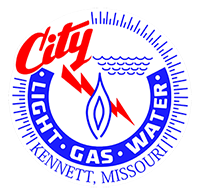
Due to the extreme cold weather from the Polar Vortex that Kennett has been experiencing over the last
10 days, CLGW customers may experience increased bills because of additional usage of utility services.
The bills that encompass the Polar Vortex weather utility usage will be received by customers in
March with due dates of March 23rd, April 3rd, and April 10th. Following is information from CLGW that
explains our billing and rates, including why utility bills are dramatically higher during extreme weather
events. For more information visit our website, www.clgw.net, one of our social media sites-Facebook,
Instagram, or Twitter, or call, 888-5366.
How is my bill calculated?
CLGW bills in three cycles for usage from the previous 30 days. For this extreme weather event bill,
depending on when your meters are read, you may see the larger bill in February or in March. CLGW
charges for electric based on the amount of kilowatts used, natural gas on the amount of CCF used, and
water and sewer on the amount of gallons used. Bills are calculated based on the consumption of each
service by the customer. Every meter is read monthly, and the reading is the customer’s actual usage for
the prior 30-day period.
Why will my bill be higher during extreme weather events?
Extreme weather outdoors, like the Polar Vortex we are experiencing, causes heating and cooling units
to work harder to keep your home at the set temperature indoors. Keeping your thermostat at the same
temperature and not adjusting it/making changes, does not mean that your unit did not use additional
electricity or natural gas. During extreme weather outdoors, the heating and cooling units must run
more often and for longer periods of time to keep the home at the temperature set on the thermostat.
Even if you set your thermostat on 60° during a cold weather event or 80° during a hot weather event,
when the temperature outdoors is below freezing or burning hot, your heating and cooling units will still
run more and more often than they would during more stable outdoor temperatures. This creates
additional usage of utilities, which in turn creates an increased utility bill from CLGW. In cold weather
events, customers may also increase their water and sewer usage by running water and flushing toilets
to help keep their pipes from freezing. This also creates additional usage of utilities, which creates an
increased utility bill from CLGW.
How are CLGW rates determined?
CLGW participates in a Cost-of-Service Study every three years. The Cost-of-Service Study provides
CLGW with the real cost it takes to provide electric, natural gas, water, sewer, and fiber services to our
customers. The Study takes into account the cost of general repair and maintenance of utility services,
the replacement of aging infrastructure, emergency and unforeseen operational costs, employee costs,
capital projects, and the cost to CLGW to purchase electric, natural gas, and Internet to distribute to
customers. The cost for CLGW to provide utilities to our customers increases requiring CLGW to increase
the rates of services. If rate increases did not occur, CLGW would not be able to maintain and improve
our utility system. We at CLGW pride ourselves on providing excellent utility service to our customers
and it takes money to make sure that it is done right.
How will the January 1st rate increase affect my extreme weather event bill?
CLGW has a rate calculator on our website, www.clgw.net, where you can enter your consumption (the
amount of kilowatts, CCF, and gallons used listed on your utility bill) to estimate the cost under our new
rates. The rate increase is very minimal and does not have a major impact on your utility bill. The rapid
increase in consumption/usage of utility services is what will have the greatest impact on utility bills
from this extreme weather event. For example: under the old electric rate 1500 kilowatt hours was
$122.43, new rate $125.02=difference of $2.59; old electric rate 3000 kilowatt hours was $233.35, new
rate $236.03=difference of $2.68; under the old gas rate 75 CCF was $80.68, new rate $82.73=difference
of $2.05. So, as you can see from the example, the rate increases only accounts for a very minimal
change in customers’ utility bills. The amount of consumption/usage will be dramatic during extreme
weather events compared to more stable temperatures and utility bills will reflect this increased usage
with an increased amount to be paid to CLGW.
How can I lower my CLGW bill?
There are many things you can do to help decrease your CLGW bill year-round. Below is a list of a few
recommended adjustments that are suggested by www.energy.gov:
Use a programmable thermostat Make sure your home is well insulated
Seal any air leaks around windows and doors Properly seal air ducts Purchase energy efficient appliances Service your heating/cooling units Change air filters are recommended by heating/cooling unit manufacturer Install energy saving light bulbs Only do full loads of laundry and dishes Line dry your clothes Turn down your water heater setting
Does CLGW offer Levelized Billing/Equal Pay?
Yes, we do! Qualifying customers can sign up to receive a levelized bill, paying a similar amount every
month. CLGW uses the customer’s past 12 months of usage to calculate the monthly payment and then
adds 5% to help cover the possibility of higher bills throughout the year. Customers will be required to
“true up” at the end of each year, which means that CLGW will write the customer a check for any
overpayment made to CLGW or we will bill the customer for any underpayment. In order to qualify for
levelized billing, customers must meet the following requirements:
Reside in the same location as a customer for the past 12 months Not more than two payments past due in the last 12 months No returned checks in the last 12 months No non-pay disconnections in the last 12 months Must set up auto-payment via ACH, Debit or Credit Card
How do CLGW rates compare to other utilities?
CLGW strives to provide our customers with the best possible service at the lowest possible rate. We
have some of the lowest rates of any of our neighboring municipally owned utilities. Our rates are very
competitive when compared to municipally owned utilities across the United States. CLGW rates are
much lower than those of investor owned and cooperative utilities. As noted above, CLGW participates
in a Cost-of-Service Study that helps to ensure that rates are set based on what it actually costs the
utility to provide the service to customers.


